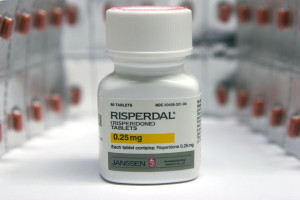Study Raises Concern over Risperdal Side Effects in Youth
 A new study from the University of Maryland found that off-label Risperdal use in youth may be linked more closely to socioeconomic status than sound medical practice. Researchers discovered an unusually high proportion of children in foster care taking Risperdal to treat ADHD.
A new study from the University of Maryland found that off-label Risperdal use in youth may be linked more closely to socioeconomic status than sound medical practice. Researchers discovered an unusually high proportion of children in foster care taking Risperdal to treat ADHD.
Findings raise serious safety concerns, since antipsychotic drugs like Risperdal have not been approved by the FDA to treat ADHD in children and serious Risperdal side effects have been reported with the drug.
The study examined date on more than 260,000 youth between the ages of two and 17. All of the children in the study were in foster care and enrolled in a state Medicaid program during 2006. The youth included in the study had been diagnosed with ADHD, but no other mental disorders had been diagnosed.
Foster care youth more likely to get Risperdal
Researchers found that children in foster care who had been diagnosed with ADHD were three times more likely to be prescribed an antipsychotic medication. Risperdal was the most common choice among healthcare providers, followed by Abilify and Seroquel. The findings were recently published in the Journal of Child and Adolescent Pharmacology.
“Atypical antipsychotic use for off-label behavioral conditions such as ADHD now accounts for the majority of antipsychotic-treated youth with Medicaid coverage, raising short- and long-term safety concerns in the absence of sufficient efficacy data to justify potentially severe treatment-emergent adverse events,” researchers stated in their findings. Other members of the medical community also voiced concern over the findings.
“This study adds critical hard data to our understanding of a persistent and unacceptable trend in pediatric psychiatry,” Dr. Harold Koplewicz of the Child Mind Institute in New York City was reported as saying at Medline Plus. “Our poorest, most vulnerable children, lacking access to evidence-based care, are receiving potentially harmful treatment with little oversight.”
Severe side effects connected to Risperdal use
Concerns over Risperdal treatment have mounted in recent years as severe side effects have been associated with the drug. Children who have been prescribed Risperdal for ADHD, obsessive-compulsive disorder, stuttering and Tourette’s syndrome have suffered side effects like neurological problems, increased risk of diabetes and unusual male breast growth, a condition known as gynecomastia.
Some boys have developed excessively large breasts, which causes psychological damage as well as physical pain. Symptoms of gynecomastia might include breast pain, swelling and nipple discharge. In some cases, Risperdal users have had to undergo surgery to remove the breasts, often while still at a relatively young age.
The manufacturer of Risperdal, Janssen Pharmaceuticals, has also marketed their drug to senior patients for the treatment of agitation associated with dementia. Unfortunately, side effects in elderly patients might include stroke and cardiovascular problems. The drug has now been linked to a higher rate of mortality within the senior population.
Penalties and lawsuits
In November 2013, Janssen pled guilty to misbranding charges involving Risperdal. The U.S. Justice Department charged the subsidiary of Johnson & Johnson with marketing their drug to senior patients, despite their knowledge that the drug could cause harmful and potentially deadly side effects in this patient population. Janssen agreed to pay $2.2 billion in fines and penalties for the misbranding charges.
Some who have been injured by Risperdal side effects have filed lawsuits against Janssen, claiming the company did not provide sufficient warning about potential dangers associated with the drug. Studies like this may encourage others to seek legal compensation for medical bills, pain and suffering and other non-economic losses.
- Journal of Child and Adolescent Pharmacology, Atypical Antipsychotic Use among Medicaid-Insured Children and Adolescents: Duration, Safety and Monitoring Implications, http://online.liebertpub.com/doi/full/10.1089/cap.2013.0094
- Medline Plus, Too Many Foster Kids with ADHD Treated with Antipsychotic Drugs: Study, http://www.nlm.nih.gov/medlineplus/news/fullstory_145617.html


 Resources
Resources
 Resources
Resources
